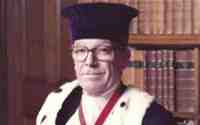




Telegraph - UK
http://www.telegraph.co.uk/news/obituaries/politics-obituaries/9624192/Sir-Charles-Frossard.html
Sir Charles Frossard
Sir Charles Frossard, who has died aged 90, became a model for mainland negotiators with Europe when he won the agreement of the EEC that Guernsey would incorporate only such European legislation as was acceptable to it.
21 Oct 2012

Sir Charles Frossard |
He joined the Gordon Highlanders, then transferred to the Black Watch and subsequently the Indian Army. Promoted captain, he helped quell unruly tribesmen along the North West Frontier and became a friend of Sherpa Tenzing, the future co-conqueror of Everest.
After the war Frossard studied at Gray’s Inn, passing fourth in the Bar Finals, and in 1949 began to practise as a Guernsey advocate. Already his economical but efficient approach was evident. He liked to say that many clients’ instructions could be noted on the back of a cigarette packet.
He was elected Deputy for St Peter Port in 1958, serving three terms. In 1967 he became a Conseiller (a senior representative, but elected by other representatives) and began two years as president of the Advisory and Finance Committee (then the leading executive body). He served from 1969 to 1973 as Comptroller General (effectively Solicitor General), then, from 1973 to 1977, as Procureur (effectively Attorney General).
It was while Comptroller General that Frossard, in his other capacity as president of the States’ (Guernsey’s parliament’s) European Free Trade Association and Economic Community Committee, began negotiations with Europe. Not only did these end with Guernsey being allowed to pick and choose from future EU legislation, but also being granted the right to export goods duty free to the Continent. Geoffrey Rippon, Ted Heath’s appointee as chief negotiator of Britain’s EEC entry, who was visiting Guernsey at the time to follow EEC-related developments there, described Frossard’s speech to the States announcing the terms as the best he had ever heard.
Frossard was Deputy Bailiff from 1977 to 1982, becoming Bailiff in the latter year. The post then had three main functions: civic, judicial and parliamentary (rather as if the Lord Mayor of London were simultaneously Master of the Rolls and Speaker of the House of Commons). In so intimate a setting as Guernsey’s, this minimised red tape. Frossard’s technique for drawing up budgets when Advisory and Finance Committee president was of Homeric simplicity. “I took the States Treasurer out to lunch”, he would say, “and we settled matters between us.”
As Bailiff, he was ex-officio a judge, and president, of Guernsey’s Court of Appeal. As such, he tidied up court procedure and nurtured relations with visiting appellate judges. On the neighbouring island of Jersey he sat both as an appeal judge and, in retirement, as a Royal Court Commissioner.
He also took on the office’s traditional role of leading delegations overseas to present Guernsey’s case, thus acting as an occasional Foreign Secretary or ambassador at large.
Frossard was knighted in 1983 and appointed KBE in 1990.
He was president of the Indian Army Association from 1993; Grand Master of the Guernsey Freemasons from 1995; and a member of the Church of England Synod from 1960 to 1982.
His recreations included scrambles in the Pyrenees, accompanied by his younger daughter Jeanne, and rifle shooting, both on Guernsey and at Bisley.
Architecturally, he is commemorated in the Guernsey Civil Service Board building, Sir Charles Frossard House. Locals call it “Custard Castle”, for its purple and yellow exterior. That colour scheme, it is safe to say, was one Guernsey policy decision over which Frossard was not consulted.
Charles Frossard married, in 1950, Betty, daughter of Advocate JEL Martel, his immediate predecessor as president of the States’ Advisory and Finance Committee. She and their two daughters survive him.
Sir Charles Frossard, born February 18 1922, died July 15 2012
Further Reading:
Freemasonry in the U.K. - Have the 'Brethren' finally met their Waterloo?